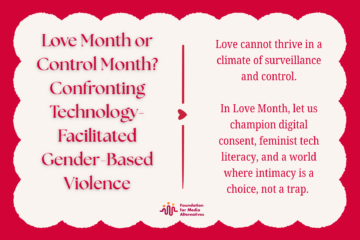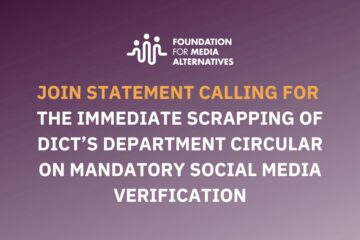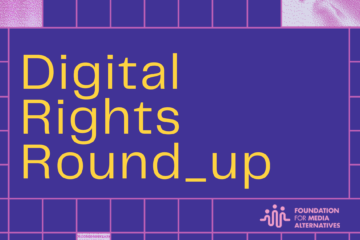On digital gender gap, voices of dissent, growth in e-commerce, and rising cases of cybercrime in the Philippines: The FMA Digital Rights Roundup
October 16-31, 2021
The Digital Rights Roundup, published by the Foundation for Media Alternatives, contains regular updates on what Filipinos need to know about their digital rights.
63 percent of Filipino adults are internet users — Pulse Asia survey
Sixty-three percent of Filipino adults use the internet, with 59 percent logging on more than once a day. Per location, 84 percent of the survey respondents in Metro Manila, 65 percent in Balance Luzon, 62 percent in Visayas, and 47 percent in Mindanao said they use or access the internet. Read more here.
PH gov’t eyes internet connectivity in rural areas
The Philippine Space Agency (PhilSA) is introducing the Incentivise project, which calls for new Satellite Internet Operators (SIOs) to conduct test deployments in selected remote sites. This would allow the performance and viability of their new and advanced technologies to be demonstrated, experienced and assessed. Read more here.
Gender inequality online costs governments $1 trillion, says web inventor’s foundation
Over the past 10 years, 32 low- and middle-income countries have lost $1 trillion by not helping more women get online. Those countries include India, Nigeria and the Philippines. Closing the digital gender gap should be one of the top priorities. Read more here.
Jose Arturo de Castro, DICT undersecretary for legal affairs, policy, planning and finance, was appointed as acting DICT chief. De Castro will serve in an acting capacity while waiting for Malacañang to fill the vacancy created by the resignation of Gregorio Honasan II. Read more here.
PCC exec says telco sector ‘not a natural monopoly’
Commissioner Johannes Bernabe said that telco services can be fully liberalized in terms of ownership. His statements come after the opposition of the foreign and local business chambers to tag telco as a public utility under the Public Services Act (PSA). Read more here.
IRR for EO on satellite Internet access cited for ‘good provisions’
The Bangko Sentral ng Pilipinas (BSP) and an independent ICT policy researcher have welcomed the issuance of the implementing rules and regulations. The IRR lays down the national policy on inclusive access to satellite-based Internet. The BSP said banks, fintech companies, and other financial sector entities will be guided in exploring ways of tapping into satellite technology. Read more here.
BSP rolls out person-to-merchant QR standard for financial transactions
The Bangko Sentral ng Pilipinas (BSP) held on Tuesday, Oct. 12, the virtual launch of the QR PH person-to-merchant (P2M) standard for financial transactions. Merchants only need to print QR codes, which the respective payments service provider will generate for them. Read more here.
BSP denies application of Digital Spring as operator of Lyka
The Bangko Sentral ng Pilipinas (BSP) has denied the request of Digital Spring Marketing and Advertising, to be registered as an Operator of Payment System (OPS) of the Lyka/Things I Like Company Ltd (TIL) Payment System. The BSP upheld the cease-and-desist order (CDO) issued against Digital Spring on July 23, 2021. Read more here.
Nearly half of Filipinos believe it is ‘dangerous’ to publish criticisms vs govt, survey says
45% of adult Filipinos agree with the statement, “It is dangerous to print or broadcast anything critical of the administration, even if it is the truth”. Of this percentage, 15% said they strongly agree, while 30% somewhat agreed. The highest score was in the Visayas, followed by Balance Luzon and Mindanao. Read more here.
Local SMEs vulnerable to cyberattacks, Cisco says
57 percent of small and medium businesses in the Philippines got hit with a cyber attack in the past year. Almost all of the local respondents said they saw issues in their cyber defenses after they simulated an attack. They were able to detect an attack, but did not have right technologies to block or mitigate its impact. Read more here.
PH is top target of banking Trojan in APAC region — Kaspersky
The Philippines logged the highest number of banking Trojan attacks in the Asia Pacific at 22.26%. This was discovered on the heels of widespread adoption of digital banking during the COVID-19 pandemic. Read more here.
The National Privacy Commission (NPC) has invited companies and organizations to apply for accreditation as an Accountability Agent for the APEC Cross-Border Privacy Rules (CBPR) System. The CBPR System is voluntary and accountability-based, and facilitates data flows that respect privacy. Read more here.
Political emergency alerts are ‘a real concern,’ says NPC chief
Using emergency text alerts for political agenda might obscure the real purpose of the system in times of calamities. Only the government can issue such alerts during disasters such as typhoons and earthquakes. The National Privacy Commission (NPC) plans to formulate data privacy guidelines that various political parties and candidates must abide by. Read more here.
Tablet the ‘device of choice’ of LGUs racing to ease remote learning dilemma
Tablets are a “device of choice” among LGUs due to their low cost and ability to run educational apps. Philippine tablet shipments nearly doubled to over 200,000 units in the second quarter of 2021 versus the previous year. The mobile devices will support distance learning during the COVID-19 pandemic. Read more here.
How Comelec will monitor Facebook, YouTube, other social media platforms ahead of Eleksyon 2022
The Commission on Elections (Comelec) has engaged Facebook, Instagram, YouTube, and TikTok to regulate and monitor the electoral campaigns and spending in the social media. Comelec Spokesperson James Jimenez said the poll body will only start monitoring advertisements starting February 8, 2022 onwards as the official start of the campaign period. Read more here.
Electoral risks heightened as more politicians deploy technology for campaigns
The National Telecommunications Commission (NTC) admitted that is “very difficult” to stop groups or individuals from using text blast machines for political campaigns. The regulator ordered Facebook, Inc., Alibaba’s Lazada Group, and Sea Ltd.’s Shopee to stop selling the equipment. The NTC is considering conducting an information drive to warn the public about these unsolicited text messages. Read more here.
Nearly half of Filipinos get news from internet, Facebook – Pulse Asia
Nearly half or 48% of Filipino adults get their political news from the internet, a survey shows. Of this, 44% cited Facebook and 10% said they visit news websites for political news. Another 7% cited other social media sites, and only 1% cited Twitter. Read more here.
Over 1,000 availed themselves of mobile number portability — TCI
Telecommunications Connectivity, Inc., (TCI) said over 1,000 subscribers have switched networks since the commercial launch at the end of September. It said it cannot provide an estimate of how many will make the switch going forward, as it would take around “three months” to establish a trend. Read more here.
Report: Smart still fastest telco, but DITO posts impressive results
The latest report from mobile metrics firm Opensignal has shown that Smart Communications is still the country’s fastest operator. DITO, however, has made a strong entrance in terms of mobile experience. The third telco only launched commercial mobile services back in March this year. Read more here.
PLDT to build first ‘hyperscaler’ data center in PH
Dominant carrier PLDT announced on Tuesday that will it build the “first and biggest” data center in the country. Facility will be telco-neutral and will incorporate sustainability in its design and operations. PLDT said it is enhancing its network of data centers to serve and deliver the much bigger requirements of hyperscalers. Read more here.
Philippine digital transformation could create P5 trillion annually by 2030 –study
The country’s internet economy was estimated at $7.5 billion in 2020 and was expected to grow 30% annually to reach $28 billion by 2025. Businesses derive P363.2 billion in annual benefits from Google tools and services through increased revenues, while application developers earn P384 million in annual revenue through Google Play. Read more here.
E-commerce firms to be held liable for sale of illicit products in proposed law
E-commerce platforms, along with parties or merchants engaged in the sale of prohibited digital products, can be held solidarily liable under proposed Internet Transactions Act. Sen. Sherwin Gatchalian said the National Telecommunications Commission’s (NTC) issued a show cause as well as cease and desist orders to Lazada, Shopee, and Facebook Marketplace. Read more here.
Globe wants to transform from telco to digital solutions platform in 5 years
Globe Telecom said on Tuesday, Oct. 26, that it is slowly pivoting away from its core telecommunications business to become a digital solutions platform over the next five to 10 years. It currently offers several diverse high-growth enterprises in healthtech, fintech, adtech, and e-commerce. Read more here.
Musk’s Starlink in talks to bring fast Internet to Philippines
Elon Musk’s Starlink is in talks with two Philippine telcos to launch its ultrafast satellite internet. The Philippines ranks 72nd in the world for mobile internet speed and 64th for fixed broadband. Read more here.
USAID launches P1.65B project to improve Philippine digitization
The US Agency for International Development (USAID) has formally launched a P1.65 billion ($33 million) digital connectivity project that aims to bridge the digital divide in the Philippines. The Better Access and Connectivity Project (BEACON) was to promote economic growth through the use of Information and Communication Technology. Read more here.
The Philippines Remains Weak Among ASEAN 6 Inclusive Internet Index Ranking
The Philippines ranked 68th in the Inclusive Internet Index (3i) out of 120 countries, tied with Trinidad & Tobago. It scored the weakest, compared to the rest of ASEAN 6: Indonesia, Malaysia, Thailand, Singapore, and Vietnam. The Philippines’ GNI per capita is at par with Vietnam. Read more here.
Bangladesh, Philippines among Worst Nations at Protecting Journalists, Report Finds
The annual Global Impunity Index is published by the Committee to Protect Journalists. It ranks Bangladesh as the 11th-worst nation and the Philippines as the seventh-worst. The Philippines has 13 unsolved murders of journalists; Bangladesh has six. CPJ defines murder as deliberate killing of a specific journalist in retaliation for the victim’s work. Read more here.
Cybercriminals use PH government agencies to trick victims
Cybercriminal activities are impersonating Philippine government agencies to trick victims into clicking and/or downloading attachments from phishing emails. Spoofed emails pretending to be from the Bureau of Customs, the cybercriminals engage with shipping, transportation, and logistics companies. Read more here.
DSWD: Agency received 331 reports of child online sex abuse from 2019 to 2021
The Department of Social Welfare and Development said it received 331 reports of online sexual abuse and exploitation of children (OSAEC) from 2019 to 2021. The cases could have worsened during the pandemic because more people have trained their attention on gadgets and technology, DSWD said. Read more here.
Ano’ng Konek? The Podcast is here!
In the Episode 1, FMA’s Program Officer for Gender and ICTs Thina Lopez and comics artist Marianie join us in a discussion on the intersection of gender, arts, and emerging issues in the Internet, especially for the vulnerable sectors.
Listen FREE on Spotify here.
Don’t forget to follow us on Spotify so you can stay updated on digital rights issues that we will discuss in the next episodes! Stay tuned!
Subscribe to UP Internet’s telegram channel for latest news and updates at your fingertips.
The UP Internet Freedom Network (UP INTERNET) is an alliance of students and volunteers advocating for internet freedom. You may e-mail them at upinternet.org@protonmail.com for inquiries.
DOWNLOAD: On digital gender gap, voices of dissent, growth in e-commerce, and rising cases of cybercrime in the Philippines:The FMA Digital Rights Roundup (16-31 October 2021)
All resources here are linked to the original websites. If any of the resources will be used otherwise, please do credit the source.



0 Comments